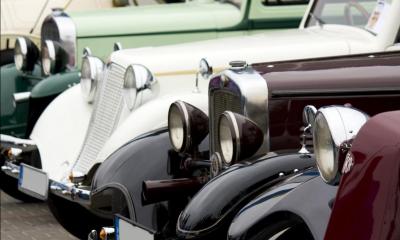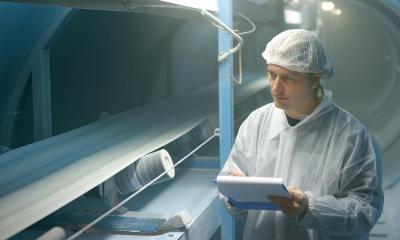
Sales of classic cars have been booming in recent years, providing opportunities for the restoration sector. Get the essentials for starting up and running your own classic car restoration business in our practical guide.
- Research the classic car restoration market
- Decide what restoration and repair services you will offer
- Why will people choose your car restoration business?
- Price your car repair and restoration services
- Promote your car restoration business
- Buy an existing car restorers
Research the classic car restoration market
Classic cars are popular in the UK, and there is a fairly steady demand for restoration and repair services. However, the industry is competitive and restoration services are available from many different sources with your main competitors being existing specialist classic car businesses, ranging from one man outfits working in a small garage to businesses located in large industrial units. Some classic car dealers operate their own restoration workshops and some general car repair businesses also undertake occasional work on classic cars.
You will want to make sure there is enough demand for your classic car restoration business. A look through the relevant classifications on Yell.com and other similar online directories will give you an idea of the level of competition. You could also try looking in classic car magazines. Try to identify how many other businesses are already providing classic car repairs, maintenance and restoration locally. If you intend to specialise in a particular make of car, you may need to think about the demand from all over the UK. You'll need to look at motor sport magazines and contact owners clubs to find out how many specialist restorers exist for the particular marque and whether owners will be prepared to transport the vehicle to your workshop for restoration.
Be aware that demand for classic cars - and the range of services that owning and running them requires - does rise and fall over the years.
It may be that you will only be competing directly against some of these because you will be targeting a particular area of the market or offering specialist services that are hard to find elsewhere. Look at the existing businesses to establish:
- whether they specialise in any way (either in a particular make of car, or in the type of work they undertake)
- whether they offer full scale restoration services or tend to concentrate on smaller jobs
- if they offer MOT preparation and testing
- if they offer paint spraying services
- what other services they offer (for example upholstery repairs, convertible roof replacement and so on)
- what prices they charge
- how knowledgeable and helpful their staff are
- whether the premises and fittings are modern and smart
Try to find out if there is a gap in the local market that your business can fill.
Your market
Most of your customers are likely to be classic car enthusiasts. Many will need regular servicing and repairs to keep their vehicles roadworthy, rust-free and in reasonable condition. Note that from 20 May 2018 most vehicles over 40 years old (on a rolling basis) are exempt from MOT testing, but they must be in safe roadworthy condition if they are used on public roads. Cars that have been substantially changed must continue to be tested annually.
As well as private motorists, you may get work from classic car dealers and exporters, classic car hire firms, funeral directors and wedding hire companies that use old vehicles.
Find out what people want
As you are likely to face tough competition, it is important to find out what people want and if there are any particular services you can offer which will attract customers. Many classic car owners work on their own vehicles and only use professional help for large and/or difficult jobs. It is important to consider this when deciding what services to offer. You could contact local motor clubs, classic car dealers or owners clubs for particular makes of car to see if there are any particular services that are in demand.
Research current trends, plus legal and tax issues
- Sector trends for classic car restorers
- Legal issues for classic car restorers
- VAT rules concerning classic car restorers
Decide what restoration and repair services you will offer
Many classic car restoration businesses undertake jobs ranging from small bodywork and mechanical repairs to large restoration projects and accident repairs that involve completely rebuilding a car. Others carry out MOT preparation work, often involving repairing corroded areas. Note that from 20 May 2018 most vehicles over 40 years old (on a rolling basis) are exempt from MOT testing, but they must be in safe roadworthy condition if they are used on public roads, and cars that have been substantially changed must continue to be tested annually. Some restoration businesses offer general servicing, modifications or preparation for classic car racing or rallying. Typically (and depending on the focus of your business) you might expect partial or full restorations to make up about 65% of your work and ongoing maintenance and repair work 35%.
Rust proofing - including initial treatment and periodic 'top-ups' - is another service which most classic car owners will require and is often applied as an essential part of a major restoration. There are several proprietary products and systems on the market, with many classic car specialists opting for Waxoyl or Dinitrol. Many firms make occasional use of other specialists for certain jobs, particularly things like re-trimming and upholstery repairs.
You could decide to buy and sell some classic vehicles as well as undertaking restoration services. And you might decide to offer a classic car hire service - this could appeal to wedding customers and others organising special events.
Full restoration services
Carrying out the complete restoration of a classic car can be complex, time consuming and require many skills and in depth knowledge. If you have worked in the sector before setting up your own business, you may feel able to undertake this type of work from the outset, but otherwise you may wish to carry out more straightforward jobs to begin with. Remember that some cars are easier to restore than others - for example, a Morris Minor is far less complex than an Aston Martin, and spare parts will also be easier to find and less expensive.
To provide full restoration services, you and your employees will need the skills to be able to carry out:
- mechanical, engine and wiring work
- welding, bodywork and re-spraying
- interior work
For a full restoration, the vehicle will have to be transported to your workshop, restored over a period of three or four months and then transported or driven back to the customer.
Specialising in a particular service, marque or model
Specialising can be a good way to distinguish your business from other car restorers and help you to compete effectively. Your market research might have revealed a gap in the market that you can fill by offering a specialist service. For example, perhaps no one in your area specialises in engine rebuilding or interior re-trimming. Alternatively, you might decide to specialise in a particular make such as MG or Triumph or even a single model such as the VW Beetle, the Mark 1 Ford Escort or the Morris Minor. You could also focus on range of vehicles of a certain type such as classic British sports cars or American cars.
Think carefully about how you might specialise. Popular cars such as MGBs, Morris Minors and air cooled VWs are often used daily and so there is a fairly steady demand for servicing, repairing and restoring these cars. However, there are already many specialists that deal with these kinds of cars and so competition can be tough. If you specialise in a less common type of classic car, you will face less competition, but you will of course be chasing a smaller number of possible customers.
Bear in mind the location of your business and its potential customer base. In some places (rural areas, for example), it might be necessary to undertake a wide range of jobs in order to get enough work. In this case it might be best, at least while your business is getting established, to undertake whatever work comes your way, on any type of car. You can always specialise later on if it seems that there will be enough work.
Why will people choose your car restoration business?
You need to make sure that enough people will choose your business rather than taking their car elsewhere.
Many of your jobs are likely to be small repairs, such as bodywork, structural welding, mechanical repairs and overhauls. For this type of work you will be competing against other classic car specialists as well as general car repair businesses that also undertake work on classic cars.
For smaller jobs like these, particularly those which don't require any specialist knowledge of the type of car being worked on, it's likely that you'll face competition from a number of local restoration and repair businesses, with some potential customers making their choice solely based on price. However, to many classic car owners price is not everything, and potential customers will also consider factors such as your reputation, the level of service you offer and the quality of work done. Classic cars are often prized possessions, owned by enthusiasts for whom the quality of work is even more important than the cost. It is also quite common for a classic vehicle to be viewed as an investment and the value of such a vehicle may be compromised if work isn't done to the required standard or if undesirable parts are used.
You might also take on larger projects, such as completely restoring a car that has not been used for many years. Alternatively, your market research may have revealed a gap in the local market that you can fill. For example, perhaps no one in your area specialises in engine rebuilding.
You could consider contacting local classic car clubs to let them know of your services and possibly offer a discount to members. You may decide to specialise in a particular make - in this case contact the owners' club for that type of car. You can find lists of the clubs in classic car magazines. Most clubs produce regular newsletters or magazines in which you could advertise. Many also have online forums, although there may be rules about blatant commercial advertising on them.
Whether or not you decide to specialise in a particular type of work, or make of car, try to emphasise the quality of your services. Joining a trade association quality scheme will demonstrate that your business is run to a high standard. Similarly, a friendly and knowledgeable approach will inspire confidence in potential customers. People working in classic car repair and restoration businesses usually have a keen interest in cars and should be happy to discuss matters with customers and to offer advice. An in-depth knowledge of older cars, restoration techniques, modifications and so on is a real strength. Classic car owners are often enthusiasts who will greatly appreciate a friendly approach and knowledgeable personal service. Make the most of these strengths and ensure your customers are aware of what you can offer.
Price your car repair and restoration services
Getting the price right is very important. When considering your pricing policy, remember that you must be able to cover your costs, overheads and drawings.
Invoices for general repair work are usually itemised, with the cost of replacement mechanical parts, panels, paint and so on, listed together with a separate charge for labour.
Parts
The charge made to a customer for parts is usually the cost price of the parts increased by a certain amount as profit margin. Many businesses add around 15% or 20%.
Labour
The labour charge depends on how long it takes you to do the job and the set rate charged per hour. Hourly rates vary considerably - you could check the competition to see what rates are charged in your area.
With other work, it is up to you to decide what to charge. For simple jobs, you may decide on a set fee - for example a fixed price for replacing a wheel bearing, re-spraying a bonnet or wing, or undersealing a medium-sized car.
For most classic car repairs it will usually be necessary to assess each job as it comes in, and agree a price with the customer beforehand. When you're doing accident repairs for insurance companies they'll expect you to quote a very competitive price and keep a tight lid on costs. Experience is necessary to estimate the extent of the work required and set a fair price. Make it clear that the price you quote is an estimate, which could increase to a certain extent if problems arise. Even so, be sure to get the customer's consent before you embark on any additional work not originally budgeted for.
Complete restoration work
Be particularly careful if you undertake complex restoration work. Disputes often arise because the amount of work required (and hence the cost) can be difficult to judge until a car is completely dismantled. A reasonable looking vehicle may turn out to be a can of worms, with extensive corrosion hiding beneath a sound looking exterior. Although you may well be an enthusiast who enjoys the work, be sure to keep track of all the hours you spend on a job and charge for them appropriately - otherwise you could end up working for little or nothing. Take care when making estimates and avoid misunderstandings by keeping customers regularly updated on how the restoration is progressing. Total restorations can take months and can cost thousands or even tens of thousands of pounds to complete. In such cases, an arrangement is often made with the customer to pay for the work in stages.
Special offers and discounts
You may decide to offer a standard discount as a matter of course to any trade customers. How much discount will depend on your pricing policy and the level of local competition.
Many businesses also give discounts to employees, regular customers, family and friends. A reduced rate could be offered to members of a classic car club. Check out the local opposition for ideas and keep a close eye on any special offers you do make to be sure that they are working for you. After all, these kinds of promotions might encourage extra business, but they will also affect the amount of profit you make on each job.
Promote your car restoration business
It's important to think about how potential customers will view your business and how you will get your key message across to them.
The right image
People's first impression of your business may be influenced by the way it looks - so it is vital to project the right image. Try to keep your premises clean and tidy and if necessary, consider repainting to brighten things up. Use signs to indicate what services you offer. If possible, have a separate reception/waiting area, where you can talk to customers.
If you operate a tow truck for collecting vehicles that are not roadworthy, bear in mind that it will be a highly visible advertisement for your business. It doesn't need to be new - it could even be a classic vehicle - but it should look smart and well maintained.
Good service
Even more important than appearance is the attitude shown to customers. Treating customers in a friendly, helpful and polite way will help to create a good impression. Reputation can only be built over time, but from the outset you should aim to offer a high level of service and ensure customers are satisfied with the work done.
Deal with any questions or complaints promptly and politely. Take care when making estimates and always contact customers before embarking on work not originally budgeted for. This is particularly important when undertaking restoration work as the amount of rust needing work can't usually be seen until a vehicle is completely dismantled. Make sure that customers are kept well informed as the restoration progresses.
Quality standards
High standards are essential to attract and retain customers. Some owners clubs publish lists of recommended specialists that are updated annually. If you specialise in a particular make, contact the relevant owners club to see if it operates such a scheme.
Various trade associations have quality assurance schemes that set strict standards for their members. Schemes include:
- the Motor Ombudsman Code for Service and Repair
- the Good Garage Scheme, which enables people to give and read feedback on participating businesses
- National Body Repair Association (NBRA) quality control schemes and the Thatcham BSI Kitemark award for vehicle body repair developed in conjunction with the NBRA, part of the Retail Motor Industry Federation (RMIF)
You may be required to undergo training and your premises may have to reach set standards before the business earns the right to display something like the NBRA sign. The effort is worth it though as you will demonstrate to potential customers the high level of service on offer.
Advertising and marketing your business
It is important that you advertise your business effectively so that potential customers know about you, the services you offer and the quality standards you work to. There are a number of things you can do to promote your business:
- use well-designed signs at your premises to inform and attract passing trade
- advertise in your local newspaper and any local directories
- advertise in classic car magazines
- contact local classic car clubs
- contact the appropriate owners club if you specialise in a particular make
- launch your own website to reach a wider market - particularly relevant if you offer specialist services not easily found elsewhere
- use social media, industry forums and blogs
- contact any nearby businesses that might have classic cars (for example, wedding hire businesses, museums, classic car hire companies) to let them know about your services and pricing structure
Buy an existing car restorers
You might decide to buy an existing car restoration business rather than start your own venture from scratch. Buying a going concern can mean that the products, customers, regular sales, staff, premises and equipment are already in place.
But buying a business can be a hazardous, expensive process unless you have the right skills and experience on your team, including legal and financial know-how. Establish the genuine trading and financial position, so that the price you pay for the business is not too high.


